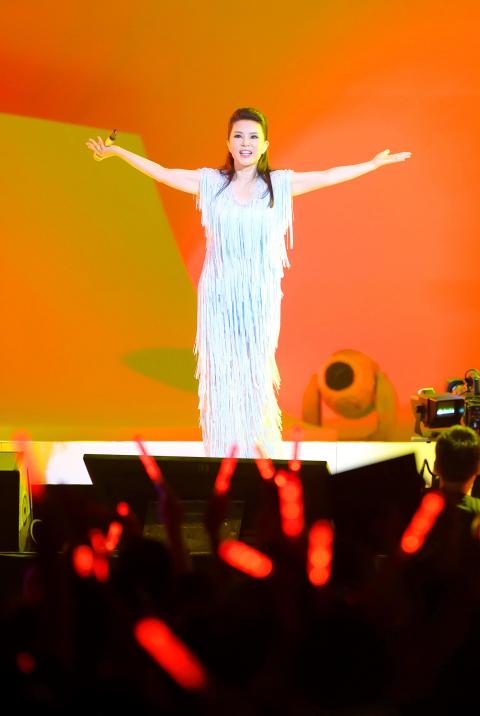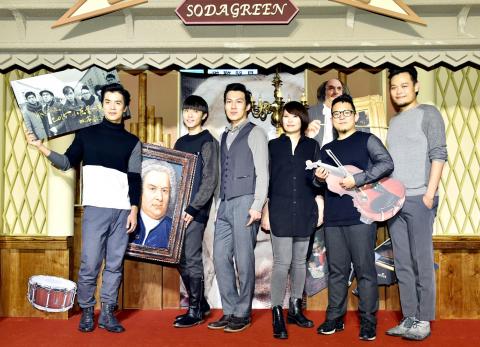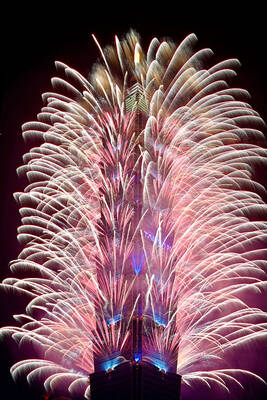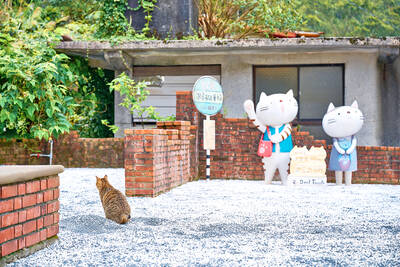Taiwanese band Sodagreen’s album “Winter Endless” led this year’s nominees for the Golden Melody Awards, with eight nominations, including Best Mandarin Album, Best Song and Best Band.
The rest of the nominees for Best Mandarin Album were: Peggy Hsu’s “Swing, Inc.,” Eli Hsieh’s “Progress Reports,” Chang Hui-mei’s “AMIT2,” Tanya Chua’s “Aphasia” and PoeTek’s “Infinity.”
The Lifetime Achievement Award went to 64-year-old Taiwanese singer Tracy Huang, who has released more than 50 Mandarin, English and Cantonese albums since the 1970s and is known for her classic songs such as “Crying Sand,” “Sending My Love Across Time and Space,” and “Can’t Dream of You.”

Photo: Hu Shuan-hsiang, Taipei Times
照片︰自由時報記者胡舜翔
Samuel Chou, convener of the jury, said one of the biggest highlights this year is the level of sophistication and diversity of the albums by new artists, some of whom entered the competition in the categories of Best Album and Best Singer.
This year 482 albums and 11,177 works were submitted for consideration, and 128 nominated works competed in 26 categories at the 27th Golden Melody Awards.
(CNA)

Photo: Chen Yi-chuan, Taipei Times
照片︰自由時報記者陳奕全
台灣流行樂團蘇打綠以專輯「冬未了」,成為今年流行音樂金曲獎的大贏家,入圍八個獎項,包括最佳國語專輯獎、最佳年度歌曲、最佳樂團等。
其他入圍最佳國語專輯獎的還有許哲珮的「搖擺電力公司」、謝震廷的「查理Progress Reports」、張惠妹的「AMIT2」、蔡健雅的「失語者」、熊仔的「∞無限」。
特別貢獻獎(終身成就獎)則頒給六十四歲的台灣歌手黃鶯鶯,她自一九七○年代起,發行超過五十張國語、英語和粵語專輯,並以「哭砂」、「時空寄情」、「夢不到你」等經典歌曲而聞名。
這次評審團總召周建輝說,今年最大的亮點之一,是金曲新人獎入圍者專輯呈現的細膩度與多元化,不少入圍者還入圍歌王、歌后、最佳專輯等大獎。
今年總共有四百八十二張專輯、一萬一千一百七十七首音樂作品報名。最後有一百二十八首作品入圍,角逐第二十七屆流行音樂金曲獎二十六個獎項。(張聖恩翻譯)

A: Wow, US climber Alex Honnold has announced that he’s going to free-climb Taipei 101 on Jan. 24. And the challenge, titled “Skyscraper Live,” will be broadcast worldwide live on Netflix at 9am. B: Oh my goodness, Taipei 101 is the world’s tallest green building. Is he crazy? A: Honnold is actually the climber in the 2019 film “Free Solo” that won an Oscar for best documentary, and was directed by Taiwanese-American Jimmy Chin and his wife. He’s a legendary climber. B: Didn’t Alain Robert, “the French Spiderman,” also attempt to scale Taipei 101 in 2004? A: Yes, but

A: There are always adventurers who want to conquer Taipei 101 as a world-class landmark. Didn’t someone once parachute from the top of it? B: Yeah, that’s right. Austrian extreme sportsman Felix Baumgartner once parachuted from the rooftop observation deck in 2007 without permission. He died earlier last year in a powered paragliding crash at the age of 56. A: Hollywood superstar Tom Cruise also almost jumped off Taipei 101 for “Mission Impossible 3.” B: What? But I didn’t see the building in the movie. A: The news says that the film’s producers applied to the Taipei City

People use far more than just spoken language to communicate. Apart from using our voices to pronounce words, we also use body language, which includes countless facial expressions. Most people know that smiles and frowns indicate pleasure and displeasure, or that wide eyes with raised eyebrows typically show surprise. However, there is a lot more to learn about how facial expressions can help or hinder communication. People often unintentionally reveal their emotions through very tiny facial movements known as “microexpressions.” The term was popularized by psychologist Paul Ekman, who found that people from cultures across the world generally recognize

Nestled in the mountain region of northern Taiwan lies a small village that was once bustling due to a thriving coal industry, only to later gain fame for an entirely different reason — cats. This is Houtong Cat Village (猴硐貓村), located in Ruifang District, New Taipei City. Traditional Coal Mining and Village Transformation Houtong was originally known as “Monkey Cave” (houtong, 猴洞), a name derived from the wild monkeys that once inhabited caves in the surrounding hills. During the Japanese colonial period in the early 20th century, rich coal deposits were discovered and developed, rapidly turning Houtong into one of northern Taiwan’s